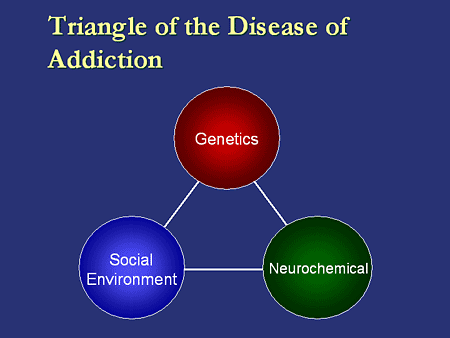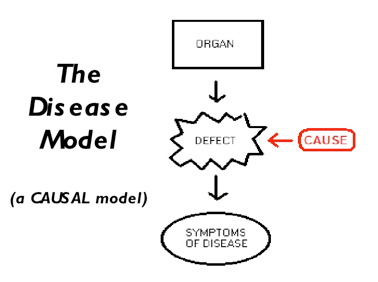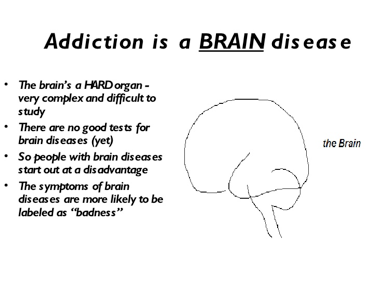The Medicalization of Addiction
Overview
Throughout the course of history, “deviant” human behaviors (e.g., addiction, alcoholism and substance abuse) have been perceived in a variety of ways. The designation of deviance is culturally determined, and maintained through social interaction and cultural representations. It seems that the issue of drug addiction is not a constant, objective reality, but is socially labeled as deviance and/or disease, varying in different historical contexts. That is, society’s views towards substance abuse and addiction are socially constructed and fluid in nature [1]. The medicalization of deviance refers to the practice of defining deviant behavior as a manifestation of an underlying sickness, to find the causes of deviance within the individual rather than in the social structure, and to treat deviance through the intervention of medical professionals [2].

^ source: http://www.medscape.org/viewarticle/495071_2
Theoretical Models of Addiction
Society has primarily viewed drug addiction according to two opposing ideologies: the “moral” model of addiction and the “disease” model of addiction [3]. The moral model of addiction suggests that addiction is mainly a matter of personal choice, and the result of a moral failure and lack of willpower. In contrast, the disease model of addiction describes an addiction as “a disease with biological, neurological, genetic, and environmental sources of origin.” [4]. The manner in which problems with addiction have been perceived has shifted over time, and has profoundly impacted the social, legal, and medical responses to these issues.


^ source: http://www.addictioneducationsociety.org/dr-kevin-mccauley-pleasure-unwoven/
The Medicalization of Addiction
For a variety of religious and political reasons, addiction has historically been perceived as a reflection of moral weakness or criminality, prompting the establishment of harsh punitive drug policies in North America and beyond [5]. But in recent years, designations of deviance and addiction have become increasingly medicalized, with this type of behavior becoming more commonly defined as a medical problem instead of a moral one [6]. This process is known as “medicalization”, and is embraced by proponents of the “disease model” of addiction [4]. The definition of deviance varies from culture to culture, and changes over time.
When addiction is construed as a moral problem or character flaw (i.e. deviance) — instead of as a health problem or disease — individuals with substance abuse problems tend to face punitive penalties and social stigmatization, rather than being provided with more effective therapeutic or rehabilitative options [7]. Medicalization changes the manner in which addiction is understood and managed, and facilitates the establishment of non-punitive treatment methods [8].
The primary goal of medicalization has been to de-stigmatize addiction by “constructing it as a brain disorder not unlike other mild mental disorders” [9], based on evidence indicating that addiction is more appropriately placed “under the banner of medicine” than the criminal justice system [9]. Drug addiction shares many features with other chronic illnesses, including an onset and trajectory that is influenced by environmental conditions and behavior, as well as a tendency to run in families [4]. Following this logic, the American Medical Association (AMA) designated alcoholism as a disease in 1956, and did the same for substance use disorders more generally in 1989 [10]. The disease model of addiction emerged in the 1940s, and in the following decades was supported by both the World Health Organization (WHO) and the American Medical Association [3].
The moral model of addiction is an outdated and problematic explanatory model relative to the disease model, because the moral model fails to account for the wide variety of factors (e.g., biological, psychological, and environmental) that influence human addiction [11]. Advocates for the disease model believe that medicalizing substance addiction will encourage a shift in policy focus from incarceration and punishment to evidence-based treatments and rehabilitation methods [10]. For example, when substance abuse problems are medicalized, hospitals and other clinical settings are given the ability to offer interventions and treatment for alcohol and drug problems, as well as render medical insurance reimbursement costs associated with treatment [1].


^ source: http://archives.drugabuse.gov/about/welcome/aboutdrugabuse/chronicdisease/
Criticisms of the Disease Model of Addiction
Although the disease model is a more appropriate approach than the moral model is for explaining and categorizing substance abuse disorders and addiction, there are some potential disadvantages and/or arguments against relying on the disease model. For example:
1) alcohol and drug problems fall on a spectrum of varying severity, making it difficult to determine the accuracy of a diagnosis [12].
2) progression of the problem over time is not inevitable
3) labeling someone as a chronic alcoholic or addict may decrease confidence in their ability to change
4) may decrease an individual’s personal responsibility for their actions, which can affect others
5) critics argue that medicalization of addiction is just another form of social construction, such as the construction of addiction as deviance [13].
Conclusion: The Debate Continues
Viewing addiction strictly as a result of moral weakness is an outdated and problematic way of thinking, as empirical studies of addiction have clearly implicated both genetic and environmental influences, among other factors [11]. As addiction is increasingly medicalized, individuals with substance abuse issues are able to turn to medical professionals to aid and facilitate recovery, instead of being punished by the state or scorned by their family and community. The debate still continues about determining the most effective manner of managing substance abuse issues. But the medicalization of addiction has been beneficial in a number of ways, such as facilitating the growth of self-help groups in America, and helping remove the social stigma attached to the “addict” label, thereby encouraging people to seek help if they need it [1].

References
- ↑ 1.0 1.1 1.2 Klaue, K. (1999). "Drugs, addiction, deviance and disease as social constructs". Switzerland: Bulletin on Narcotics. https://www.unodc.org/unodc/en/data-and-analysis/bulletin/bulletin_1999-01-01_1_page005.html
- ↑ Horwitz, A. V. (1981). "The medicalization of deviance - book review": Contemporary Sociology, 10(6) 750-752
- ↑ 3.0 3.1 Fieser, J. (2008). "Drugs: Moral Issues that Divide Us and Applied Ethics: A Sourcebook". https://www.utm.edu/staff/jfieser/class/160/3-drugs.htm
- ↑ 4.0 4.1 4.2 McLellan, A. (2002). Have we evaluated addiction treatment correctly? Implications from a chronic care perspective: Addiction. http://dx.doi.org/10.1046/j.1360-0443.2002.00127.x
- ↑ Stanford University (1999). "Poverty and Prejudice: Ethics of Development in a Global Environment". https://web.stanford.edu/class/e297c/poverty_prejudice/paradox/htele.html
- ↑ Manning, Nick (1989). "The therapeutic community movement: charisma and routinization". London: Routledge. p. 1. ISBN 0-415-02913-9l
- ↑ Orcutt, James (2011). "Medicalization of Drug Problems: Addiction as Brain Disease". http://syp4550.socworld.com/Unit_13/Page_1.html
- ↑ Marshall, Gordon (1998). Medicalization: A Dictionary of Sociology. http://www.encyclopedia.com/doc/1O88-medicalization.html
- ↑ 9.0 9.1 Campbell, Nancy D. (2015). "Medicalization and Biomedicalization: Does the Diseasing of Addiction Fit the Frame?" In Critical Perspectives on Addiction. Published online: 08 Mar 2015; 3-25
- ↑ 10.0 10.1 Szalavitz, Maia. (2016). “Why the ‘Disease Model’ Fails to Convince Americans That Addiction Is a Health Issue” The Influence. http://theinfluence.org/why-the-disease-model-fails-to-convince-americans-that-addiction-is-a-health-issue/
- ↑ 11.0 11.1 . Addiction is a Chronic Disease: Many Factors are Involved in Addiction The Influence: National Institute of Drug Abuse. http://archives.drugabuse.gov/about/welcome/aboutdrugabuse/chronicdisease/
- ↑ Clark, David. (2016) “The Disease Model of Addiction” AddictionInfo. http://www.addictioninfo.org/articles/3650/1/The-Disease-Model-of-Addiction/Page1.html
- ↑ Ireland, Corydon. (2009) “Scholars discuss ‘medicalization’ of formerly normal characteristics” Harvard News Office. http://news.harvard.edu/gazette/story/2009/04/scholars-discuss-‘medicalization’-of-formerly-normal-characteristics/